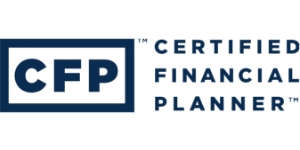
Minimum Qualifications for the Certified Financial Planner (CFP®)
CERTIFIED FINANCIAL PLANNER™ professional I am certified for financial planning services in the United States by Certified Financial Planner Board of Standards, Inc. (“CFP Board”). Therefore, I may refer to myself as a CERTIFIED FINANCIAL PLANNER™ professional or a CFP® professional, and I may use these and CFP Board’s other certification marks (the “CFP Board Certification Marks”). The CFP® certification is voluntary. No federal or state law or regulation requires financial planners to hold the CFP® certification. You may find more information about the CFP® certification at www.cfp.net. CFP® professionals have met CFP Board’s high standards for education, examination, experience, and ethics. To become a CFP® professional, an individual must fulfill the following requirements:
- Education – Earn a bachelor’s degree or higher from an accredited college or university and complete CFP Board-approved coursework at a college or university through a CFP Board Registered Program. The coursework covers the financial planning subject areas CFP Board has determined are necessary for the competent and professional delivery of financial planning services, as well as a comprehensive financial plan development capstone course. A candidate may satisfy some of the coursework requirement through other qualifying credentials.
- Examination – Pass the comprehensive CFP® Certification Examination. The examination is designed to assess an individual’s ability to integrate and apply a broad base of financial planning knowledge in the context of real-life financial planning situations.
- Experience – Complete 6,000 hours of professional experience related to the personal financial planning process, or 4,000 hours of apprenticeship experience that meets additional requirements
- Ethics – Satisfy the Fitness Standards for Candidates for CFP® Certification and Former CFP® Professionals Seeking Reinstatement and agree to be bound by CFP Board’s Code of Ethics and Standards of Conduct (“Code and Standards”), which sets forth the ethical and practice standards for CFP® professionals.
Individuals who become certified must complete the following ongoing education and ethics requirements to remain certified and maintain the right to continue to use the CFP Board Certification Marks:
- Ethics – Commit to complying with CFP Board’s Code and Standards. This includes a commitment to CFP Board, as part of the certification, to act as a fiduciary, and therefore, act in the best interests of the client, at all times when providing financial advice and financial planning. CFP Board may sanction a CFP® professional who does not abide by this commitment, but CFP Board does not guarantee a CFP® professional’s services. A client who seeks a similar commitment should obtain a written engagement that includes a fiduciary obligation to the client.
- Continuing Education – Complete 30 hours of continuing education every two years to maintain competence, demonstrate specified levels of knowledge, skills, and abilities, and keep up with developments in financial planning. Two of the hours must address the Code and Standards.
